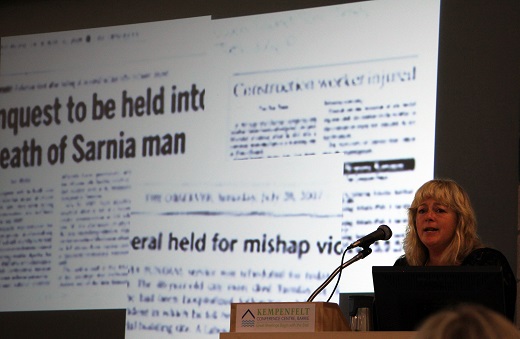
Carolyn Sim shares how a devastating workplace tragedy changed her life forever.
It’s a great honour to hear someone share their story of loss — to be invited to bear witness to such love and deep pain, and to be trusted with its weight.
Each year our Threads of Life speaker volunteers present their stories dozens of times in venues and events across the country. And each year, new volunteers step up to become speakers — incredibly brave souls who feel a personal call to share their story with others.
Our speakers so often hear comments along the lines of,
“I could never do that / I could never talk about what happened with strangers / I could never do what you do” that I thought maybe we could talk about why we share our personal experience of workplace tragedy, and why some of us choose to share our story publicly.
1. We share to make sense of what will never make sense.
Traumatic loss changes everything. This is the simplest explanation for why we feel a need to share our stories.
If you’ve experienced a loss significant enough that it divides your life into “before” and “after”, then you know that time alone does not heal these wounds. We share our stories to help ourselves come to grips with the loss we’ve experienced. To help us make sense of experiences that will never truly make sense.
The unnatural order of burying your child.
Of witnessing your friend and co-worker’s death or traumatic injury.
Of hearing the surgeon prepare you for the likelihood that he isn’t going to survive.
Of holding his hand, with brave face on, shattered by the doctor’s outline of what you should and shouldn’t expect.
No more hikes with the dogs. No more hockey with “the boys”. No canoe trips or snowmobiling.
Life as it was is over, including yours. The need to share our experience is borne of great loss and it’s delivered with great love: for the lives lost or forever changed, including your own.
2. We share to be heard.
In our culture, we do not do grief well. We turn away and protect ourselves from pain. I have yet to meet someone who’s experienced a great loss who hasn’t also lost valued relationships in the fallout.
It can be challenging to find a trusted person to hear your words and witness you working through your pain and grief. The truth is that so many of us who have experienced a workplace tragedy have lived through terrifying experiences. We have lived the stuff of other peoples’ nightmares.
Why is there such demand for our volunteer family guides? Part of the reason is that those living in the aftermath of a workplace tragedy need to be heard by someone who isn’t afraid to hear their truth. They need to be heard by someone who understands the depth of their pain. Someone who can listen and not try to fix what cannot be fixed.
3. We share to prevent.
At Threads of Life, we speak often about the importance of sharing our stories in the name of prevention. We believe our stories inspire the commitment necessary to shift perceptions and beliefs to deepen the value of protecting workers’ health and safety.
Sharing our stories is our contribution to the narrative of workplace health and safety in this country and in the world. Our stories are the reminders that the outward effect of workplace tragedies are far-reaching and life-long. Our lives have been changed forever.
We want you to understand what a lack of commitment to preventing injury and illness has cost us. We want you to commit to doing your part to prevent others from having to live with this reality.
Why do we share our stories publicly?
Sharing our stories publicly comes from a burning desire to prevent such unnecessary pain and suffering from happening to others. Speaking publicly about the workplace tragedy that’s forever changed your life is not for everyone. Not everyone feels the need to share in this way. It’s also common for our speakers to admit – sometimes even with disbelief – that they didn’t know it would be possible for them to want to share their experience as a volunteer speaker. And yet they do. It’s a personal call to action that you either feel or you don’t.
As with any other message shared in the spirit of prevention, we never know the impact of our stories shared. We’ll never know of the lives saved due to a shift in perspective or a strengthening of conviction to prevent future workplace tragedies. We’re fueled by the feedback from audience members and event organizers sharing their sincere thanks along with what they took away from hearing our stories, but we operate on faith.
The ripple effect from hearing our stories is no more calculable than that of the effect of the tragedy itself.
What we know for certain is that there is tremendous power in sharing your story. Every story shared underlines what we already know: every one is one too many.
- Strong corporate leadership lights the way for Steps for Life - November 9, 2023
- Gathering this fall with online workshops - August 31, 2023
- Steps for Life walkers and teams who STEPPED IT UP! - June 15, 2023

 Find Support
Find Support Donate
Donate